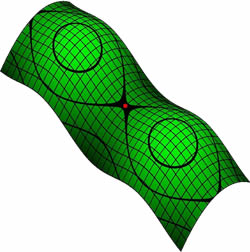Computer-aided modelling in the workshop
 Class: Hard Materials – all levels
Class: Hard Materials – all levels
Teacher: Arthur Johnstone
School: Waihi College
Category: Resources/skill development
The context
After extensive experience teaching technology in the UK, Arthur Johnstone recently took up a position at Waihi College. Waihi College is phasing in more Technology Education focussed classes when traditionally the balance has towards techni-craft courses. While the transition itself has been straight forward, helped by strong support from both principal and Head of Department, Arthur felt teaching Technology in a traditional workshop context was challenging, particularly when it came to student workbooks and portfolios. "Our students had been very reluctant to complete the documentation aspect of the work, when they did it was often poorly presented if presented at all" says Arthur.
The resource
From his experience in the UK, Arthur brought five PCs into the workshop and introduced his students to Computer-aided Modelling (CAM) software, to improve student engagement, increase creativity and improve documentation.
With ability to manufacture using CAD/CAM, Arthur's students are now able to explore a range of possible solutions before they start on physical work of making their project.
"The result has been a significant improvement in the outcomes. There is no doubt that this investment has had a significant impact on the work we do in school and has an impact on student attitudes and expectations."
Arthur believes that student interactions with such technologies as CAM Software are vital if they are to take part in an every changing society.
"I have found that if students are engaged in work which they find challenging but relevant they will meet the challenge. The technology allows students to create work which matches the quality of the products they can buy in shops. With students being increasingly motivated by the design of these products, MP3 players, mobile phones etc, the difference between what we make in the school environment and what our students buy in the market place has rapidly widened."
In summing up Arthur notes that emphasis on written work, modelling, and research need not to be viewed as sucking the life out of a subject evolving from a practical skill based classes. More importantly, he sees such skills as adding to student preparation for a technological future.
"Technology is the future. Teaching technology does not mean that [practical] skills are diminished rather we are teaching skills relevant to the world our students will be living in today and into the future. The numbers of our students who will make their living in environments where manual skills are the priority are few and this has been the case for some time, both here and in the UK.
"To argue that because New Zealand has a skills shortage, practical teachers should focus on skills, may miss the fact that this does not provide the best experience for most students – many of whom will not use purely practical skills in their careers. If Technology is properly taught, however, there should be no reason why those pupils who do want to develop their careers by following a trade-based course should be any less disadvantaged."

